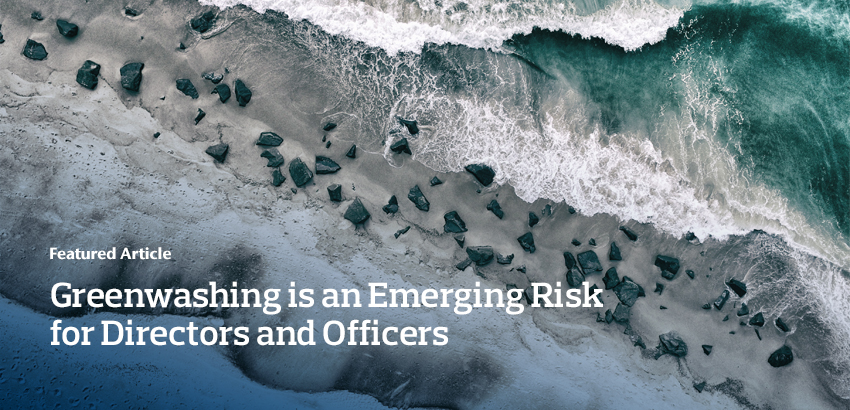Aon | Financial Services Group
Greenwashing is an Emerging Risk for Directors and Officers
Release Date: September 2022 Public company directors and officers are facing increasing pressure from stakeholders – investors, shareholders, employees, customers, and regulators – to take a more proactive stance on Environmental, Social and Governance (ESG) issues.
Some argue that these non-financial goals can benefit our environment and society while relaying useful predictive information about the company’s long-term financial success.
At the same time, concern has also grown over potential “greenwashing,” where firms make exaggerated claims about their progress even when following the best intentions.
Inadequate coordination across internal business units and operating departments could lead to risks in this area. As companies are pushed toward making ambitious ESG goals while simultaneously facing intense scrutiny on their ability to meet them, greenwashing litigation and regulatory actions are emerging as a significant concern for Boards.
From a regulatory perspective, the Securities and Exchange Commission (SEC) created the Climate and ESG Task Force last spring and proposed several new rules:
- March 2022: Publicly traded companies will be required to make climate-related disclosures, regardless of materiality considerations
- May 2022: ESG-focused investment firms and funds will be required to provide additional metrics
- May 2022: Funds with ESG-related names will be required to invest at least 80% of assets in the ESG factor suggested by its name
While the proposed rules still face an uncertain future, the SEC’s Enforcement Division is already using its authority to pursue claims that firms’ ESG-related disclosures are materially misleading. Recently, charges have been brought against a mining company and a financial institution.
At the same time, some companies are making voluntary commitments, and meeting and tracking progress for those goals will be important. According to a Net Zero Tracker database, “more than one-third (702) of the world’s largest publicly traded companies now have net zero targets, up from one-fifth (417) in December 2020. But 65% (456/702) of corporate targets do not yet meet minimum procedural reporting standards.”*
There have only been a few securities class actions based on greenwashing, notably against a beverage company and a bank. That said, widespread net zero goals coupled with an unclear path to account for, and meet, those goals create an environment ripe for shareholder litigation. Once a carbon reduction, or any other ESG commitment, is made, public financial stakeholders and others expect transparent disclosure about the path to that goal and meaningful tracking of progress.
In this rapidly shifting ground, public company directors and officers will need to learn how to navigate the heightened scrutiny and remain diligent in their approach to disclosures and representations.
* Net Zero Tracker. Energy and Climate Intelligence Unit, Data-Driven EnviroLab, NewClimate Institute, Oxford Net Zero. 2022.
Contact
Discuss this risk issue with Aon professionals Alexander Minier, Laura Wanlass and Veronica Benzinger.

Alexander Minier
Senior Vice President & Team Leader
Boston

Laura Wanlass
Partner, Corporate Governance & ESG Advisory
Virtual

Veronica Benzinger
National Practice Leader - Environmental Risk Solutions
West Palm Beach

